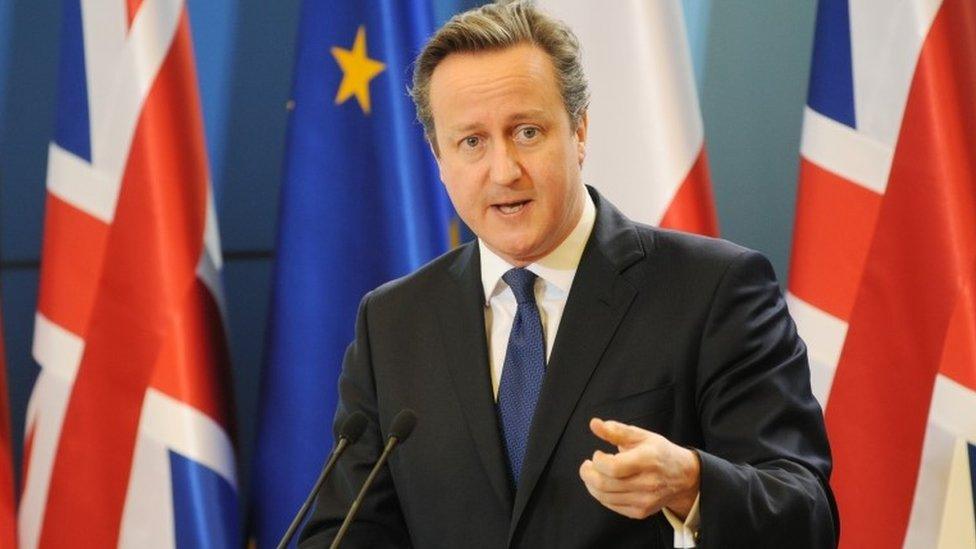Prime Minister prepares for EU pitch
- Published

It's more than two years since the prime minister sketched out the big picture of how he wanted to change the EU.
It's now only two days until he has his first significant chance to start a convincing fight for the deal he wants the rest of the European Union to sign up to - what he described when he promised the public a referendum back in 2013: "Fundamental, far reaching change."
At a dinner in Brussels on Thursday night, David Cameron will make his first full representations to his counterparts around the continent, along with the no doubt luxurious hors d'oeuvres, but (this time) before the coffee.
The prime minister will argue for an end for Britain of "ever closer union" - where EU countries align more and more closely; guarantees that the UK will never lose out economically because it has chosen not to join the single currency, the euro; leaner regulation, improved "competitiveness", and most troublesomely for the British negotiating team, action to curb immigration, including making it harder, much harder, for workers from the rest of the EU to claim benefits if they are living and working here.
Fundamental principle
The prime minister has already acknowledged, very publicly in a speech last month, that restricting benefits for Europeans working here, whether they be Poles, Italians, Spaniards, Romanians or any others, will be a difficult political sell for other countries, to put it mildly.
His counterparts, like the Polish leader last week, have not been shy about making their objections known.
The fundamental complaint is simple - that it would not just be unfair for the same workers in the same job, paying the same taxes, who happened to have grown up in different parts of the EU, but a clear case of discrimination.
But for the government, and no doubt for many members of the public, it is unfair that workers from other parts of the EU who have only recently started to work and pay tax here, should be entitled to the same benefits as British people who have paid into the system for many years. Same scenario - entirely different conclusion.
The wider point about this particular plan is that it challenges a fundamental principle of the EU - that all of its citizens are equal, and entitled in law, to the same treatment and protections.
And sources familiar with what's going on suggest the problem may not just between the UK and many other countries in the EU on this issue, but there is also unease in the government in Westminster.
Conflicting opinions
While some of David Cameron's political advisers want to push forward on the plan to ban EU workers from claiming in-work benefits for four years, it seems there is caution among his non-political civil servants, who are concerned about whether such a move would be legal.
There have been suggestions before that the country's most senior civil servant, Sir Jeremy Heywood, has warned ministers the change would be against the law.
Now, as what Number 10 describes as a "significant moment", the summit, approaches, this tension between officials involved in the negotiations and Mr Cameron's political team is becoming "part of the problem" another source said - with conflicting opinions inside government about what is feasible, as well as with EU counterparts.
A Downing Street source told me they "don't recognise that at all'. But given how high the stakes are, perhaps we shouldn't be surprised that there are doubts inside government about what can really be achieved, as well as an awful lot of persuading to do in other countries.
And as the hours tick down to the summit, the backdrop for the PM's efforts is perhaps becoming more hostile to his efforts.
A new poll by ICM suggests that among people who have reached a view, half would vote to leave the European Union, and half would choose to stay - the highest rating from the same polling organisation for those who plump for the exit.
Bumpy week
And a Westminster committee today, albeit led by one of the most vehement Eurosceptics, warns the PM is not on course to "deliver the legally binding and irreversible agreement leading to reform of the EU nor a fundamental change in the UK's relationship with it envisaged by him".
Number 10 is adamant they will put their most ambitious proposals on the table for discussion this week, despite the public and private reservations around their most controversial suggestions.
This week will be important, but no-one expects a substantial deal before February.
Indeed, it may not ultimately be to David Cameron's disadvantage for this week to appear to be extremely bumpy, to demonstrate that he is willing to take a proper fight to the rest of the EU.
And of course, we are six months away from the earliest possible date for a public vote.
But time and political perseverance may not be enough to persuade voters that something substantial in our relationship with the EU can and really will change.